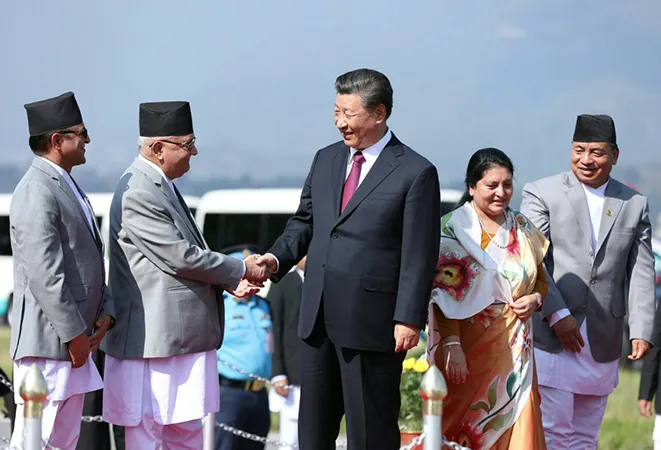
Recently, the Chinese President Xi Jinping visited Kathmandu on his return trip from India on October 12 and 13, 2019. Nepal extended red-carpet welcome to him. A number of agreements were signed between Nepal and China on this occasion. But there is an impression that the agreements in general were made in China’s favour. So much so that Xi stated that Nepal and China are strategic partners. Hitherto, only India was regarded as Nepal’s strategic partner because of the 1950 Treaty of Peace and Friendship between the two countries. This clearly manifests China’s attempt to secure the space that India occupied in Nepal.
Of the 20 agreements signed between Nepal and China during Xi’s visit to Kathmandu, most of the agreements, including Nepal’s support to Belt and Road Initiative (BRI), railway and roads connectivity between China and Nepal, and Nepal’s reiteration to ‘One China Policy’ at a time when China is facing problems in Hong Kong and other parts of the country are crucially important to China both from its security and strategic considerations.
However, it is very difficult to pinpoint as to what is that Nepal gained from the 20 agreements made with China. Both the railway and the roadway connectivity between the Chinese border and Kathmandu provide the upper hand to China. It will not only prove a great asset to China to make its presence felt in different parts of Nepal but also it will help this country to have access to the Indo-Nepal border through the Nepalese territory. China dreams of engaging Nepal in ‘tri-lateral’ trade between China, Nepal and India. Experts view that the main objective of 'tri-lateral' trade s to use the Nepalese territory as a transit point to target the vast Indian market, mainly in Bihar and Uttar Pradesh, whose population is over 10 times as compared to Nepal.
At a time China’s BRI is viewed with suspicion and resistance in different countries, China successfully motivated Nepal in getting its support for the BRI. The country signed BRI in 2017. Under BRI, Nepal agreed to work on $2.75 billion trans-Himalayan connectivity network for the construction of road tunnel along the road from Jilong/Keyrung to Kathmandu and also for conducting a feasibility study for the construction of railway line. China has already built a railway line from the mainland China to Shigatse via Lhasa and it plans to extend it to Kerung (China)/Rasuwagadhi (Nepal) border point at Nepal-China and further to Kathmandu and other parts of the country.
It is well known that Sri Lanka received loans under BRI for the Hambantota port from Export-Import Bank of China worth US$ 307 million. The interest rate on the loans to that port was as high as 6.3 per cent, which compelled Sri Lanka to pay almost 90 per cent of its revenue for servicing the debt. Later on, not being in a position to repay the mounting debt, it had a little option left but to give 70 per cent ownership of the Hambantota port on lease to China Merchants Group for 99-years. In Laos, the high-speed rail project cost half the GDP of the country. Even in Pakistan, the fair-weather friend of China, hue and cry is being made in certain quarters against BRI for issues related to debt trap.
During Xi’s visit to Nepal, China also committed to extend aid for rebuilding road between Kathmandu and Rasuwadhi (Nepal)/Kerung (China) border point in the next four to five years. This could reduce the transportation time between the two places from almost six hours at present to two hours. Because of its strategic importance, Beijing’s interest in traditional Kathmandu-Tatopani-Lhasa route that was built in the 1960s shifted in favour of Kathmandu-Rasuwagadhi/Kerung road.
Nepal’s reiteration of its commitment to ‘One China Policy’ in which it acknowledges Tibet as an internal affair of China is obviously important. There are nearly 20,000 Tibetan refugees in Nepal and each year hundreds of refugees illegally inter into Nepal for their final destination to India. Initially, in the 1960s and even afterwards Nepal was more sympathetic to the cause of the Tibetan refugees, but later on with the growing influence of China into Nepal the Nepalese law enforcement machinery increased surveillance in Nepal’s northern districts to help Beijing in tracking and deporting them back to China.
Of the 20 agreements signed between Nepal and China, four of the agreements have strong security components that aim at developing greater engagements between the security agencies of the two countries, particularly among the police forces, intelligence outfits, border management organizations and the law enforcement authorities. In this context, China will be organizing 100 training schemes for the Nepalese law enforcement authorities over the next three years.
Of course, China did not succeed in its attempt to pursue Nepal to sign the Treaty of Extradition, but it gained mileage by signing the Treaty on Mutual Legal Assistance in Criminal Matters, which is regarded as a precursor to Treaty of Extradition. As mentioned in the Joint Communiqué at the end of Xi Jinping's visit, the Chinese are hopeful that even the Treaty of Extradition would be concluded soon.
As mentioned in the Joint Communiqué, some other projects that would have far-reaching ramifications include Kimathanka-Leguwaghat section of the Koshi Highway and also the development of three North-South corridors in Nepal, including Koshi Economic Corridor, Gandaki Economic Corridor and Karnali Economic corridor.
Some other projects that figured prominently in Joint Comminiue included the establishment of a multidisciplinary Madan Bhandari University for Science and Technology in Nepal with Chinese support. Also, important is the project for the Integrated Development of the resettlement of the scattered population in the Himalayan region of Nepal.
Two sister city agreements have also been signed – one between Kathmandu Metropolitan City of Nepal and Nanjing City of China and the other between Butwal Sub-Metropolitan City of Nepal and Xi’an City of China. There was also agreement for setting up Confucius Institute at Tribhuvan University in Kathmandu. Besides, the Chinese also agreed to provide 100 Confucius Institute Scholarships to the Nepalese. Possibly, China agreed to provide Nepal assistance worth $500 million for investment in different development projects out of Nepal's generosity to support the Chinese cause in Nepal.
Unfortunately, Nepal remained failure in bargaining with China in trade deal as well as in serving its economic interests. In 2018-19, Nepal’s exports to China amounted to Rs. 2.1 billion; while its imports from that country were to the tune of Rs. 205.52 billion. This resulted in Nepal's burgeoning trade deficit with China which culminated to Rs. 203.4 billion. It means that Nepal exports only 2 per cent of what its imports from that country. Nepal failed to bargain with China to give it adequate concessions to increase its exports to that country.
On the whole, the agreements made between Nepal and China during Chinese President Xi Jinping's visit to Kathmandu obviously appear to be tilting more in favour of China - be it in security, strategic and other economic affairs. This could be due to the fact that the agreements were made between two 'unequal' powers – China being the far stronger power. Nepal could not gain anything tangible in its deals with China. Against this backdrop, it is wondered if Nepal could protect its interest while getting loans under BRI. In the existing situation, it will be unfortunate if Nepal becomes victims of 'debt trap' as it is the case of several other countries that accepted loans under BRI framework.
The views expressed above belong to the author(s). ORF research and analyses now available on Telegram! Click here to access our curated content — blogs, longforms and interviews.




 PREV
PREV


